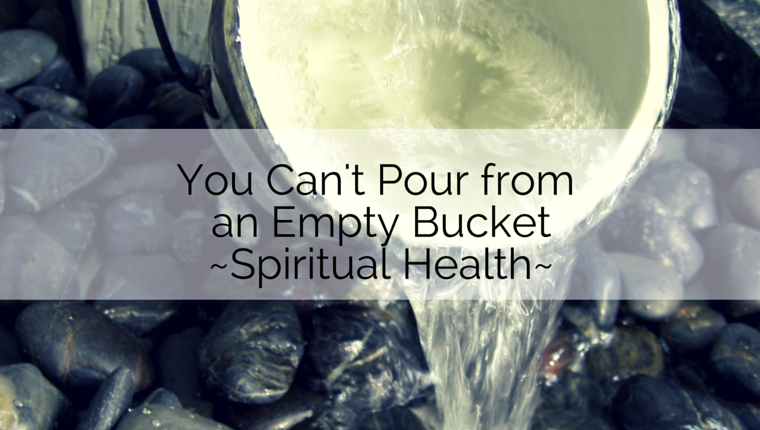Spiritual Health
Youth workers – paid and volunteer – are constantly asked to pour into others. So, how do we make sure our own buckets don’t run dry? This series is encouraging self-evaluation in the area of personal health. For the sake of conversation, we’ve divided personal health into four big areas: relational, intellectual, physical and spiritual. Today we’ll finish with spiritual health. So let’s ask the question, how does your spiritual bucket get filled?
Your Spiritual Bucket
What is it?
This is a tough one to talk about. On the one hand, it’s pretty obvious that our spiritual buckets have to do with our relationship with God. But, if we’re going to talk about how we get filled or what it looks like to get filled we see right away that this bucket is very different from all the others. I can fill up my relational bucket. I can make sure I’m pouring into my intellectual bucket. I set schedules and goals for maintaining my physical bucket. But, only God can fill my spiritual bucket. That’s a good thing (because if it relied on me, there would be no hope of anything pouring in). It’s tough to talk about spiritual health because my tendency is to say that I can’t do anything about the state of my relationship with God.
You can do something. You can do something very simple. You can’t make your faith grow. You can’t deepen your relationship with God by your own work. You can’t fill your own spiritual bucket. But, you can show up where God has promised to work. There are three places God has promised to show up: His Word, His sacraments, His people. These are the places where God has promised to “fill your bucket.”
What fills you?
Worship with the family of God is central to our lives as His children. If the three places mentioned above are where God has promised to be present, all three come together beautifully in our worship. Allow God to fill you up in worship – hearing and speaking His word, gathering with His people and receiving forgiveness in the Lord’s Supper.
Additionally, find time to allow God’s Word into your week. Prayer is a great gift our God has given to us, but don’t let your conversation with God be one-sided. Allow Him to speak back to you by spending time in His Word on a daily basis. Take advantage of other opportunities to gather with God’s people as well. In the context of family, small groups, neighborhood gatherings, church committees and volunteer groups we have opportunity to speak God’s Word to one another and remind one another of the grace, mercy and peace we have in Jesus.
How are you doing?
Your salvation is not dependent on how you feel. Know that as you confess and believe in Jesus as God’s Son and your savior, you have a home in God’s family now and forever. In the water of Baptism, know and cling to God’s promise that He will always call you His child.
With that assurance, we can also acknowledge that our feelings about faith will rise and fall. As this happens in your life, find brothers and sisters with whom you can be open about this. Allow God’s family to walk with you in the celebrations and in the desperation. Pay attention to the other three buckets. As they become drained, they will affect how spiritually full or empty you may feel. If your spiritual struggle is ongoing or overwhelming, talk to your pastor. Seek out those who teach and lead at your church. Allow God to pour into you through His gifts and His people.
Other Resources
If daily devotions are new for you, start small. If you’re not in the habit of daily setting aside time don’t try to read the Bible in a year. That’s going from 0 to 20-plus minutes of reading each day. Instead, start by setting aside a couple minutes each day and focus on making the habit a daily habit. Portals of Prayer is a great resource. Lutheran Hour also has a free online daily devotion available here.
I love to journal as part of my daily devotion. You can learn more about the SOAP method of journaling here.
A fill up
Psalm 121:1-2
I lift up my eyes to the mountains—
where does my help come from?
My help comes from the Lord,
the Maker of heaven and earth.
Conclusion
I hope this framework is helpful. I’ve used this for self-evaluation, and in teaching settings. I’ve used the buckets analogy to give leadership teams a language to talk about personal health and congregational health. Incorporate these ideas in conversation with your youth, youth leaders and other teams you work with. Let me know how it goes! I’d love to hear your success stories as well as help you navigate the struggles.
As a final thought, read St. Paul’s words. Keep in mind that you are the jar he’s talking about. You’re a vessel that’s meant to be filled, and God has a desire to fill you up! God wants to fill your bucket!
But we have this treasure in jars of clay, to show that the surpassing power belongs to God and not to us.We are afflicted in every way, but not crushed; perplexed, but not driven to despair; persecuted, but not forsaken; struck down, but not destroyed; always carrying in the body the death of Jesus, so that the life of Jesus may also be manifested in our bodies. (2 Corinthians 4:7-10)






0 Comments